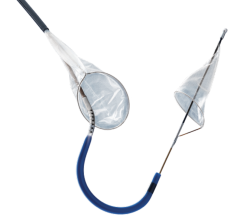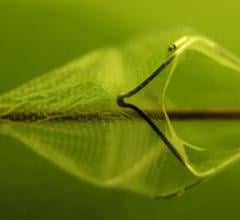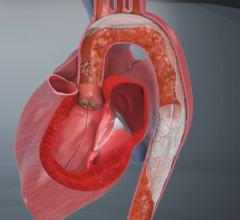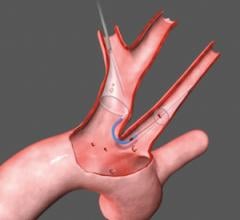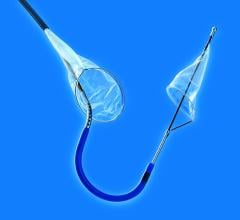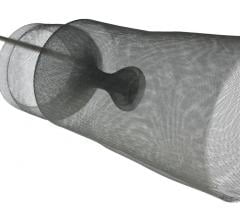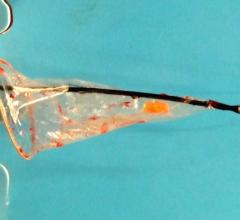May 30, 2013 — Cerebral function is the essence of quality of life. Its preservation throughout medical procedures is a key component to procedural success and patient care. New scientific data presented at the annual EuroPCR Congress in Paris heightens the spreading understanding and recognition that protecting the brain and preserving brain reserve is an important goal of transcatheter aortic valve replacement (TAVR) and other cardiovascular procedures.
The first report on the DEFLECT-I clinical trial was presented at EuroPCR, during the Hot-Line - First-in-man in Valvular Heart Disease session by M. Mullen, M.D., the PI of the study. The TriGuard device is designed to minimize the risk of brain damage associated with cardiovascular procedures and was used to filter the embolic material from brain circulation during TAVR. The results demonstrate an impressive reduction of new brain lesion volume during TAVR when performed with the TriGuard Cerebral Protection Device when compared to unprotected procedures (historical data):
- Maximum single lesion volume in DEFLECT-I was 17 times smaller than the average in the reported literature (0.39 vs. 6.45 cm3), representing a 94 percent reduction.
- Maximum total lesion volume in DEFLECT-I was 95 percent smaller than the maximum total lesion volume in reported studies (3.94 vs. 70.3 cm3).
- Average (mean) single lesion volume in DEFLECT-I was 65 percent smaller than the average of reported historical data (0.12 vs. 0.34 cm3), and average total lesion volume was 57 percent smaller than reported average total lesion volume in reported historical data (0.7 vs. 1.64 cm3).
In addition, the brain protection by TriGuard was safe, with no device related adverse events, had no interference with TAVR procedure, and performed optimally covering all three cerebral branches in 87 percent of the cases throughout valve replacement.
TriGuard, the only embolic protection device designed to cover all aortic cerebral branches, is fashioned to accommodate various anatomical variations of the aortic arch.
Keystone Heart's presence at EuroPCR, Europe's largest professional meeting specializing in interventional cardiovascular medicine, was greeted with great interest. Focus on cardiovascular procedure related brain damage, clinically evident and silent stroke, and potential preventative measures was emphasized in additional sessions, as well as in non-affiliated scientific presentations throughout the course and congress.
Keystone Heart's Scientific Advisory Board Meeting was held adjacent to EuroPCR. Participating key opinion leaders reached unanimous agreement on a number of issues:
- Stroke is a devastating adverse event after cardiovascular procedures
- Systemic therapy is highly unlikely to prevent strokes related to dislodgement of calcified material and valve particles
- Mechanical protection such as filters or deflection devices should be incorporated into the procedures to protect the brain from ischemic insults
- DEFLECT-I results demonstrate great promise and value of cerebral protection
"The issue of stroke is one of the key areas of development for enhancing procedural safety in TAVR and other invasive treatments in cardiology," said Jeffrey Moses, M.D., Columbia University in New York. "The preliminary data from the TriGuard MRI study points to this technology as a potential solution to this important issue"
The TriGuard Cerebral Protection Device is an investigational device and not commercially available.
For more information: www.keystoneheart.com

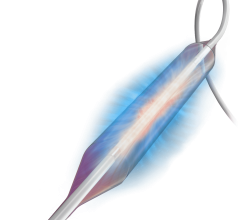
 April 25, 2023
April 25, 2023 

